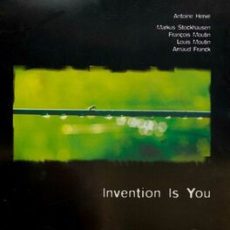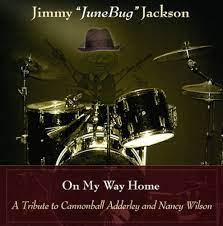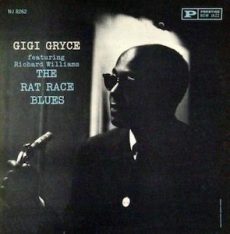
Daily Dose Of Jazz…
Antoine Hervé was born on January 20, 1959 in Paris, France. He studied composition at the Conservatoire National Supérieur de Musique. Between 1987 and 1989 he was director of the French National Jazz Orchestra.
Next to musicals, soundtracks for movies and dance shows Hervé has composed a concert for trumpet and a piece for drums and orkest. During 1997 he and Markus Stockhausen founded a quintet.
Emerging as a gifted representative of his generation of improvisers, his delve into fusion music, European classical music, contemporary and modern jazz led him and 12 other musicians to form the group Bob 13. He would go on to create a trio with bassist Michel Benita and drummer Peter Gritz.
His influences have been Bill Evans, Wynton Kelly, Oscar Peterson and McCoy Tyner, as well as Chopin, Debussy and Bartok.
Pianist Antoine Hervé continues to explore the realm of jazz through his compositions and performance.
More Posts: bandleader,history,instrumental,jazz,music,piano

Daily Dose Of Jazz…
James Charles Jackson Jr. was born on January 18, 1957 and raised in Kalamazoo, Michigan. Hailing from a musical family, he grew up surrounded by instrumentalists and vocalists. Before reaching high school, he was the drummer in his brother’s band, Ripple, that recorded and played gigs in the area. When it was time to go on the road his mother was adamant that he must finish high school.
Graduating in 1977 he landed a job in Atlanta, Georgia as the drummer for The Counts. Jimmy played with them for a few years until they disbanded, then transitioned to the Mose Davis Trio. Though much younger than his bandmates, he played well beyond his years.
Getting his big break came with meeting jazz organist Jimmy Smith, who had a show in Atlanta and Davis loaned him his Hammond organ for the performance. After moving the instrument, Jackson asked if he could sit in on the sound check. Blowing Smith away with his playing during the sound check landed him a job with the organist. He would tour the world with the band.
While residing in Atlanta, Jimmy played with the Paul Mitchell Trio at Dante’s Down the Hatch, as well as freelancing around town. Leaving Atlanta in 2006 for New York City and then on to the Washington, D.C. area a year or so later. His heart always considered Atlanta as his second home
Drummer and vocalist Jimmy Jackson, who was affectionately known by most as Junebug, died on January 28, 2012 of complications associated with congestive heart failure at the age of 55.
More Posts: bandleader,drums,history,instrumental,jazz,music

Daily Dose Of Jazz…
Jeffrey Arthur Berlin was born on January 17, 1953 in Queens, New York. He studied violin from the age of five until he turned fifteen 15. After seeing the Beatles he was inspired to play bass guitar. He attended Berklee College of Music to study bass.
After a period of session work with Patrick Moraz, David Liebman and Patti Austin, in 1977 he gained widespread international attention when British musician Bill Bruford. He handpicked Jeff for his debut album Feels Good to Me, and played in the namesake band until 1980.
His Bruford bandmate, Allan Holdsworth, employed Berlin for his 1983 Warner Brothers album Road Games. Over the course of his career he recorded with Esther Phillips, Don Pullen, Ray Barretto, David Liebman, Herbie Mann, David Sancious, Clare Fischer and numerous others. As a leader, bass guitarist Jeff Berlin continued to record and tour throughout the 1980s, 1990s and 2000s, and still performs to this day.
More Posts: bandleader,guitar,history,instrumental,jazz,music

Requisites
The Rat Race Blues ~ Gigi Gryce | By Eddie Carter
Multi-instrumentalist Gigi Gryce was one of the most exciting jazz musicians during the hard-bop era. In addition to the alto sax, he also played the flute and clarinet. He was also known as a brilliant arranger and composer. This morning’s record from the library, The Rat Race Blues (Prestige New Jazz NJLP 8262), is a splendid 1960 session that was one of the best records he recorded between 1955 and 1960. It’s the quintet’s second appearance together following their previous release, The Hap’nin’s. The ensemble consists of Richard Williams on trumpet, Gigi Gryce on alto sax, Richard Wyands on piano, Julian Euell on bass, and Mickey Roker on drums. My copy is the 1983 U.S. Original Jazz Classics Mono reissue (Prestige New Jazz OJC-081).
Side One opens with The Rat Race Blues by Gigi Gryce. A fiery uptempo smoker that begins with a scintillating introduction by Gigi and Richard soaring over the rhythm section. Wyands begins the first solo with his fingers flying fiercely over the keys. Williams opens the throttle on the muted trumpet next, and Gryce heightens the excitement in the finale. Strange Feelin’ by Sam Finch slows the speed to a medium pace for the ensemble’s relaxing melody. Williams steps up first for a carefree solo. Gryce gets into something good in the following reading. Wyands concludes with a charming interpretation, leading to a perfect climax.
Boxer’s Blues by Gigi Gryce begins with a two-instrument dialogue between Richard and Wyands. Gigi, Julian, and Mickey join them for a mellow theme. Gigi starts the solos with a lovely melodic line. Williams lays down the next elegant groove. Wyands takes over to give a graceful performance ahead of the reprise and slow fade. Blues In Bloom by Norman Mapp begins Side Two with a soft-voiced bass solo by Euell that segues into the quintet’s melody. Gryce goes to work first with an exceptionally tender tone, and then Williams carefully caresses the second reading with sensitivity. Richard delivers the closer with plenty of heart and soul into the theme’s restatement.
Monday Thru Sunday, also by Norman Mapp, is a slow blues that reaches a medium beat for the ensemble’s melody. Gigi solos first with a beautifully conceived interpretation. Williams maintains the therapeutic tempo in the second reading. Wyands is entirely at ease in the third statement, and Euell makes an impeccably polite comment during the ending theme. Esmond Edwards supervised The Rat Race Blues, and Rudy Van Gelder was the recording engineer. Gary Hobish mastered this Original Jazz Classics reissue. The album’s sound quality is excellent, with a superb soundstage placing the listener’s sweet spot in the center, surrounded by the quintet as they’re playing.
The Rat Race Blues is the next to last record Gigi Gryce would make before leaving the music scene to become a beloved music teacher in the Bronx. He continued teaching until just before his death at age fifty-seven on March 14, 1983. Of the eleven albums he recorded in those five years, The Rat Race Blues by Gigi Gryce is one of the gems that hard-bop fans shouldn’t miss on their next record shopping trip. It’s also a superb listening experience I’m sure you won’t be able to listen to just once!
~ The Hap’nin’s (Prestige New Jazz NJLP 8246) – Source: Discogs.com © 2024 by Edward Thomas Carter
More Posts: choice,classic,collectible,collector,history,instrumental,jazz,music,saxophone

Daily Dose Of Jazz…
Mike Stern was born Michael Sedgwick on January 10, 1953 in Boston, Massachusetts and grew up in Washington, D.C. He attended the Berklee College of Music in Boston and when he was twenty-two, he became a member of Blood, Sweat & Tears, spending three years with the band. During this stint he appeared on the albums More Than Ever and Brand New Day.
1979 saw him joining Billy Cobham’s fusion band. Two years later he joined Miles Davis, making his public debut in 1981, a performance recorded on the album We Want Miles. He remained with Davis through 1983 until he was replaced by guitarist John Scofield. From 1983 to 1984 he toured with Jaco Pastorius and in 1985 returned to tour with Davis.
Stern’s solo debut, Upside Downside, with Jaco Pastorius, David Sanborn, and Bob Berg, was released on Atlantic Records in 1986. For the next two years he was a member of Michael Brecker’s quintet, appearing on Don’t Try This At Home. His second Atlantic album, dropped in 1988, was Time in Place, and he would go on to release more than a dozen albums.
He formed a touring group in 1989 with Bob Berg, Dennis Chambers and Lincoln Goines. His acclaimed 1993 album, Standards (and Other Songs), led to his being named Best Jazz Guitarist of the Year by the readers and critics of Guitar Player. He was nominated for two Grammy awards, received another Best Jazz Guitarist award, and in 2009 in the first of a series of articles celebrating Down Beat‘s 75th anniversary, Stern was named one of the 75 Great Guitarists of all time.
Serious injuries to his shoulders and right arm after tripping and falling led to the ending of his 2016 European tour. Modifying his playing technique in the summer of 2017 he returned to Europe on tour with a new formation called Mike Stern/Randy Brecker Band, featuring Randy Brecker, Teymur Phell and Lenny White.
Guitarist Mike Stern, who received a Certified Legend Award from Guitar Player magazine, continues to perform, record and tour.
More Posts: bandleader,guitar,history,instrumental,jazz,music



